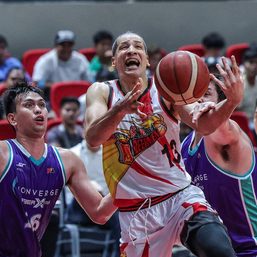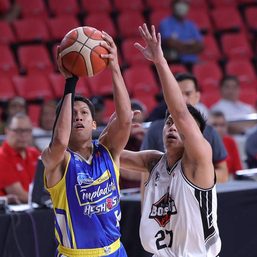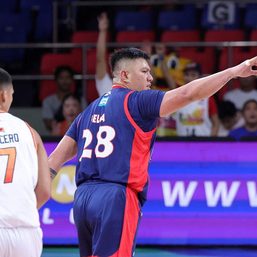SUMMARY
This is AI generated summarization, which may have errors. For context, always refer to the full article.

The diplomas we claim today tell four or five years’ worth of stories. These stories are about moments when we questioned our boundaries. “Hanggang saan ang kaya ko?” (What are my limits?) Moments when we recognized our power. Hala, kaya ko pala! (I didn’t know I can do this!) Moments when we realized we were not alone. Hindi ako nag-iisa, bakit hindi ko kakayanin? (I am alone in this, how should I even fail?)
When we accept that we don’t weave our lives alone, by ourselves, gratitude comes naturally with remembering. Gratitude to the God whom we call by many names for having made all this possible. Gratitude to our families for their supportive understanding, patient guidance, and caring acceptance—even when we detoured from the path they had prepared, so we could find out who we truly are and what we are all about.
Gratitude to our friends for widening our worldview, and for their companionship especially when life left us clueless. Gratitude to our professors, the non-teaching staff, and the many strangers we have come across—people who taught us more about life through what they fear, and what they fight for. Indeed, with so much gratitude, there is hardly room for regret or brokenness.
In a gathering months ago, Fr. Jett shared some insights on regret and brokenness. Moved by the moment, a psych major stood up and proposed: “Fr. Jett, maybe there are no real regrets and no true brokenness.” The naïve boy knew he was on to something. He brought the question with him, entertained it from time to time, and today—when he finally holds the microphone in front of you all—he has the courage to admit that he still hasn’t completely figured it out yet.
But today, I do have a hypothesis: Baka wala naman talagang pagsisisi, nakakalimutan lang nating kilalanin ang biyaya ng mga sandali. Baka hindi naman talaga nagwawakas ang lahat sa pagkawasak, hindi lang natin nakikita ang pag-asang magsimula muli. (Maybe, there are no real regrets – that we just forget to acknowledge grace in every moment. Maybe not all brokenness translate to endings. We just fail to see the hope in beginnings.)
Before I sound too philosophical, let me outline what I really want to say so you know when to celebrate and think “Yes, malapit na siyang matapos! (Yes, he’s about to finish his speech)”
(Narito ho ako para pag-usapan ang hangganan, kapangyarihan, at samahan. (I am here to discuss endings, power, and togetherness)
Hangganan: Boundaries and limits
My thesis-mates and I researched on the psychological experience of doctors who inadvertently contributed to the death of their patients. Our results show that doctors invoke an image of God to make sense of the crisis event. One participant saw God as anextramural being who takes charge of matters beyond the scope of medical practice. Whatever she could not do as a doctor, she justifiably appropriated to a God outside the walls of her profession. Her image of God was a boundary she had set for herself.
Limits are naturally there. We have no control over them. Think deadlines. Think the number of possible organizations you can join during RecWeek. Think your maximum human potential vis-à-vis biological restrictions. Think pagkatapon, the “thrown-ness” our lives are made to deal and work with. Limits put a cap on the possible, and exceeding them may bring about ill consequences, but we are free to explore and to reach after them.
On the other hand, we draw our own boundaries. We get to decide when to finish our projects before the actual deadline. We have a say on how much commitment we pour into the orgs we chose. We discern which strengths to develop or which weaknesses to work on. We have the will whether or not to hold on to the thread of life despite circumstances beyond our control. Boundaries are self-determined distinctions between what is “possible” and what is not. They are subjective, like comfort zones. It may be inconvenient to shatter them, but what results is a more concrete sense of freedom and growth.
Bilang probinsyano, hindi naging madali para sa akin ang malayo sa pamilya at sa nakagisnang pamumuhay. (As someone from the province, it was not easy to be away from my family and from the life I have known since I was a kid.)
In my early freshman days, all I wanted was to blend in and perform well enough to keep my scholarship. Fortunately, after interacting with people and understanding where their opinions were coming from, I realized that my worries and fears were chains I made for myself.
Sa kalaunan ng aking pakikibahay at pakikibuhay, natanto kong walang mangyayari kapag sariling pakiramdam at kapakanan lang ang iniisip ko. (As I adjusted in my new home and life, I realized nothing will happen if I focus on my own feelings and comfort) If I dreamed only for myself and my family, if I worked only in service of my friends, if I cared only for those who can pay me back—then what a small dream I dream, what a distorted view of service I have!
Nang natutunan ko kung paano makinig sa kuwento ng kapwa, sumunod na rin ang pagtanggap sa katotohanang kailangang basagin—hindi ang sarili—kundi ang mga hangganang ako mismo ang nagtakda. (When I finally learned to listen to others, I began to accept the truth about the necessity of breaking, not myself, but the limits I have set on my own)
My fellow graduates, the Ateneo has always challenged us to be men and women for others. It sounds cliché now, cheesy even. But, today, I hope you see it in a different light, Feel it with a different flavour. Up to what extent am I “person” enough to be for “others”?
Hanggang saan nga ba ang kaya ko? Kaibigan, ikaw lamang ang magtatakda ng hangganan mo. (What is my limit? Only you can set your own limits.)
Kapangyarihan: Power of moments
But now: What makes us powerful? Surely, it is not some superhuman ability we have inherited, not some mutant we have become after drinking Starbucks coffee and Cobraenergy drink for those all-nighters. I think what makes us powerful is precisely the real limit which makes us human: time. Forget looking at life in terms of years. Let us focus on what we have, what we hold—the power of moments.
The Ateneo made us buy a lot of blue shirts. But among all the shades of blue in my closet, I have never outgrown my NSTP Yapak and GK-Ateneo shirts. These two have witnessed all the smiles—all the stress—I have savoured with people outside of Ateneo. They remind me of how I spent time with Jehu, my NSTP kid, in all attempts of making English more fun and Math less intimidating for him. They remind me that although my efforts as a student volunteer seem so small compared to what still needs to be done in this country, no act of kindness is ever wasted.
This is why I never underestimate the hope we spark in our GK builds over at Payatas and Nueva Ecija. Hindi man matapos ang bahay sa isang araw, mananatili ang alaala ng mga taong nakasama mo. Naging bahagi na kayo ng paglalakbay nila. (Though we didn’t manage to finish building a house within a day, the memories remain. You have been part of their journey)
The way you shared your time with them—time you can never get back—the way you helped paint the walls of their new homes; the way you shared a meal with them—iyon ang babalikbalikan nila. Iyon ang panghahawakan mo. (These are things they will remember. These are things you can hold on to)
Ito yung mga sandaling nasabi kong makapangyarihan ako, hindi dahil may nangyari buhat ng aking pagsisikap, kundi dahil naging bahagi ako ng mga pangyayari sa buhay ng iba. (These are the moments when I can say that I am empowered, not because something materialized from my hardwork, but because I became a part of someone’s life)
It is my hope that others get to experience the same empowerment as well. An opportunity would be to join the Bayani Challenge this summer. GK-Ateneo is forming volunteer teams to help rebuild communities ravaged by recent disasters. You may contact me for details later.
In many ways, our Ateneo education empowers us. We were taught not to blindly follow the theory-application (3x) format. But rather, we were trained to go through the cycle of arriving at questions and reflected actions rooted in experience in order to rethink current theories. All this has provided a holistic learning experience which cannot stop after graduation, but must continue for a lifetime.
SOH/SOM: My friends in the SOH and the JGSOM, we have always been called to be professionals-for-others. Equipped with theories and tempered by moral convictions, we are well on our way to practicing responsible business and ethical trade. May we pursue professions and not mere careers. Hopefully, our craft will profess not so much what we were taught but more of what we have learned; not so much what can drive profit but more of what matters to people and this planet; not so much what society expects but more of what we can stand up for.
SOSE/SOSS: My friends in the SOSE and the SOSS, we have always been aware of the two limitations of Science. First, Science is ever-changing. What is true today may be found to be false tomorrow. This demands great adaptability and continuous learning on our part. Second, Science is morally neutral. The results of our studies are neither good nor evil. Stories can either reveal the truth or forge deceit depending on the hand that holds the pen. Pictures can either spark inspiration or instill fear depending on the mind behind the lens of a camera. Science opens the door not only to opportunity, but also to responsibility.
Samahan: Never alone
We have heard it said: “With great power comes great responsibility.” However, people are afraid of responsibility, and have come to fear power as well. Fr. Jett warned us about this weeks ago. A.M.D.G.—Ang Matakot, ‘Di Gagalaw. (The fearful would not move)
Months ago, I told my mentor Dr. Queena Lee-Chua that my prime motivation to be a psychiatrist was to be in a position of authority where people will listen to how I envision Psychology working for nation-building. The thought that I wanted power—scared me. But Doc Queena told me: “Alich, there is nothing wrong with wanting power. You are a good person, and you will use power for the good. But call me the moment power starts to corrupt you. Babatukan kita! (I will smack you in the head!)
I realized the fault in my thinking and in the logic of all great men who devolved into tyrants when power corrupted them. At some point, power isolated them and built a cradle for heartless decisions. They were convinced that they had to do everything all by themselves. But the point is this, my friends, we are never alone. We can take responsibility for power, together. Sama-sama tayo, walang iwanan! (We are in this together!)
Batchmates, graduation is a gift of closure and new beginnings. Maghihiwalay tayo, pero sana hindi tayo magkaniya-kaniya. (We may separate, but I hope we don’t disconnect from one another)
I also hope it won’t take another Yolanda or another earthquake to bring us together. Let us continue to keep in touch, and to remind each other that not one of us is stronger than all of us. If we keep our unity, there is no reason why we cannot bring about a better Philippines. Let us keep in touch, and help each other remember.
Let us help each other remember how it feels to always get the thesis statement we were least prepared for; how safe we felt when our hands landed on our ID because Kuya guard was just around the corner; how sweeter Ate Alma’s “Ingat kayo, pangga!” sounded during hell weeks; how ADSA would call for not-so-random random drug tests; how we rallied our heartstrong cheers and shed our tears at MOA and Araneta; how it felt to read your entry over at AdMU Secret Files; how fiercely we worked for that RiB audition, DL moment, that JSEC stall, that JTA slot, or that thesis; how the Jesuits have been so persuasive in promoting their vocation seminars but they don’t seem to have succeeded in recruiting me—at least not yet; and how difficult it was to answer that metaphysical question, “Kanino mo ibibigay ang Blue Rose mo? (To whom you will give your blue rose?)”
At huwag rin natin kalimutang may lipunan tayong ginagalawan. (Don’t forget that we are living within a society) Our lives are texts in context, and I hope we remember our shared experiences as a people. Today, the Filipino Christian finds himself in what continues to be a nation of crucified people—each person driven to the cross by the nails of inequality and injustice. Farmers are being threatened to give up their land. Workers across industries normally do not see the end product of their labor. We hear news about people unnecessarily put to death in local and international wars, or marginalized because quality healthcare and education have become a privilege than a right. And, it doesn’t help that we keep redefining development without asking for whom we are pursuing it. Perhaps there is something about the way we live that must be changed now if we are serious about a brighter future.
Our Ateneo education has helped us understand the situation of the poor and the vulnerable. We have raised relevant questions on social structures that promote corruption and tolerate injustice. Hopefully, we don’t stop with mere awareness. Our love of God should always (3x)be transformed into a love for the last, the least, and the lost.
The world outside the Ateneo will test our principles and give muscle to our values. It will whisper false limits, and try to drain our ideals so we get tired of dreaming, of caring, of daring.
But graduation is precisely commencement—the hope of beginning again. Your coming up this stage speaks of the pain you can endure. Your receiving that rolled sheet of paper speaks of the power of moments you are yet to unlock. Your taking a dignified bow speaks of the promise to put up a good fight against injustice and inequality. Your going back to that seat speaks about your commitment and conviction that we will never be alone.
Class of 2014: Always remember that we are boundless, powerful, and together.
Batukan natin ang isa’t-isa kung kailangan para maalala iyan. (Let’s smack each other on the head in order to remind one another)
Daghan kaayung salamat, ug maayung hapon sa tanan! – Rappler.com
Alisson Ray Ladaga graduated Cum Laude and Class Valedictorian from the Ateneo de Manila University with a degree in BS Psychology. He will pursue Medicine in the Ateneo School of Medicine and Public Health under a Merit Scholarship. In the long term, he wishes to shed light on how Psychology can be used for nation building.
Add a comment
How does this make you feel?





There are no comments yet. Add your comment to start the conversation.